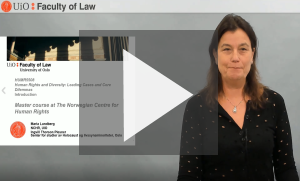HUMR5508 – Human Rights and Diversity - Leading Cases and Core Dilemmas
Course description
Schedule, syllabus and examination date
Course content

This multi-disciplinary course focuses on how human rights case law addresses dilemmas in cultural diversity. The main focus is jurisprudence in the fields of freedom of religion or belief and minority rights, including rights of indigenous peoples, as these rights are interpreted both by international case law and in various regional and national jurisprodence. The case analysis aims at a discussion of selected international human rights norms and some core dilemmas that states face in fulfilling the requirements of international human rights law, while taking various cultural traditions into consideration. These dilemmas will be discussed in light of normative theories on individual and state.
Learning outcome
When you have completed this course you should have basic knowledge about the core content of the rights in this field (in particular International Covenant on Civil and Political Rights arts. 1, 18 and 27, complemented by the International Covenant on Economic, Social and Cultural Rights arts. 1 and 15 and the ILO 169 Convention on Indigenous and Tribal Peoples).
Second, you should also have insight in the conflicts and tensions between these rights and other human rights (e.g. freedom of religion or belief in conflict with rights of women) and third, an ability to assess these rights from different disciplinary perspectives in case law analysis. Students should develop understanding for dilemmas relating to contextual interpretations of universal human rights, and be able to debate various justifications of these rights as well as their limits.
Admission
You may register for this course if you have admission to a Master's programme at UiO. All applicants must fill the formal prerequisites.
Priority is given to students admitted to Theory and Practice of Human Rights (master's two years) and then students admitted to the Human Rights programme option of Public International Law (master's 1 1/2-years).
Students admitted to other Master's programmes may apply for guest student status.
Prerequisites
Recommended previous knowledge
Introductory course in human rights.
Overlapping courses
5 credits overlap with HUMR5507 – Leading Cases in Human Rights Law (discontinued)
Teaching
Lectures (some seminar exercises included)
Examination
Written assignement, with a maximum of 5500 words, assignments with text exceeding the word limit will not be sent to grading.
Examination support material
This is an open book exam. Candidates may therefore make use of all available sources during the examination period.
Your exam paper must be an independent work. Exam candidates are not permitted to communicate with other persons about the exam question(s) or distribute draft answers or exam answers.
General rules on exam support materials
Use of sources and rules for citing
Familiarize yourself with the use of sources and citations in legal writing. In an exam situation, using other people’s material without declaring it in a clear manner may be considered cheating or an attempt at cheating. You must cite any sources you draw on.
Language of examination
The examination text is given in English, and you submit your response in English.
Grading scale
Grades are awarded on a scale from A to F, where A is the best grade and F is a fail. Read more about the grading system.
Marking criteria
This guide is used by examiners for grading this course.
Explanations and appeals
Resit an examination
- Illness at exams / postponed exams
- Resitting an examination.
- There are special rules for resitting a passed examination in the master's programme in Law.
If a student has submitted a written assignment a second time in the same course s/he can only submit it in a new version. This means that there must be another title and theme, or that the new version must be considerably changed from the first version.
Students who wish to retake the exam in a later semester are not guaranteed that the course is ever repeated with a similar reading list, nor that the exam arrangement will be the same.
Withdrawal from an examination
It is possible to take this exam up to 3 times. If you withdraw from the exam after the deadline or during the exam, this will be counted as an examination attempt.
There are special rules for resitting a passed examination in the master's programme in Law.
Special examination arrangements
Application form, deadline and requirements for special examination arrangements.
Evaluation
The course is subject to continuous evaluation. At regular intervals we also ask students to participate in a more comprehensive evaluation.